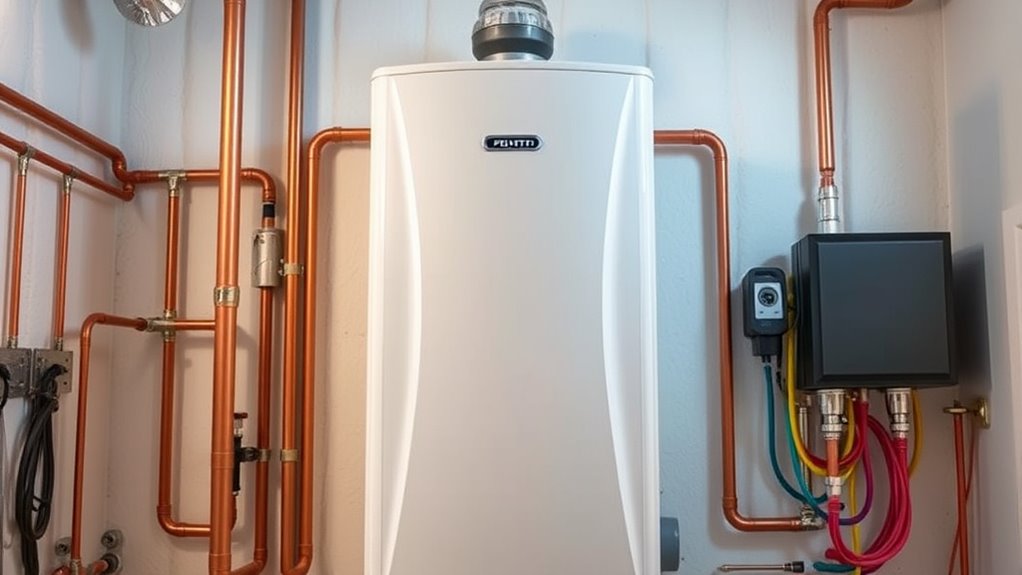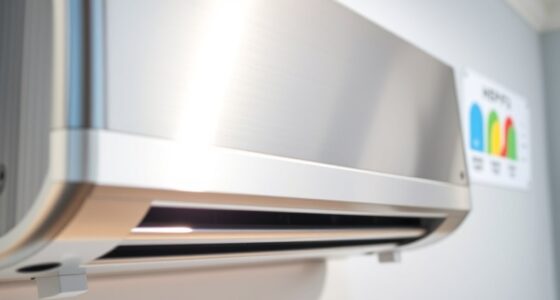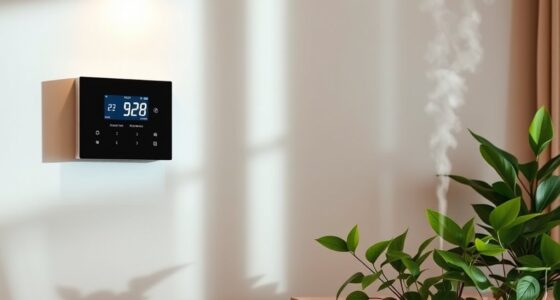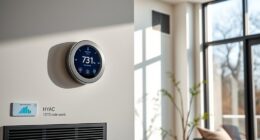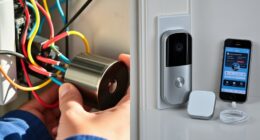Heat pump water heaters use ambient air to efficiently heat your water, consuming much less energy than traditional models. They capture heat from the surrounding air and transfer it to your water tank, which helps lower your utility bills and reduce your carbon footprint. While they’re great for moderate climates, they work best with adequate airflow and moderate temperatures. If you want to learn more about how they work and their benefits, you’ll find useful details ahead.
Key Takeaways
- Heat pump water heaters use ambient air to efficiently heat water, reducing electricity consumption.
- They perform best in moderate to warm climates but may need supplemental heating in colder areas.
- Higher upfront costs are offset by long-term energy savings and available rebates or incentives.
- Proper installation and adequate airflow are essential for optimal performance and efficiency.
- They offer eco-friendly benefits by lowering carbon emissions compared to conventional electric water heaters.
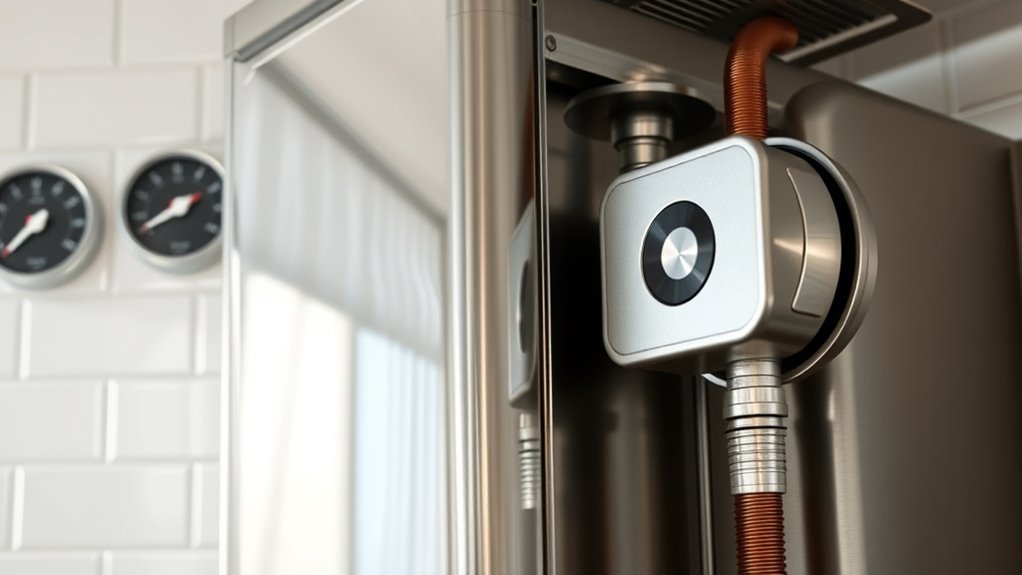
Heat pump water heaters are an energy-efficient alternative to traditional electric water heaters, using ambient air to heat water instead of directly generating heat. This innovative technology captures heat from the surrounding air and transfers it to the water, making it a more sustainable option for your home. Because they rely on existing heat in the environment, heat pump water heaters consume considerably less electricity, leading to lower utility bills over time. Their high energy efficiency makes them an attractive choice for homeowners seeking to reduce their carbon footprint and save money on energy costs.
However, when contemplating a heat pump water heater, you should think about installation costs. While the unit itself might be more expensive upfront compared to conventional water heaters, the installation process can also influence the overall expense. These systems typically require a dedicated space with adequate airflow and ventilation, as they work best in areas where the air temperature remains moderate. This might mean you need to invest in modifications to your existing space or choose a location that meets these requirements. Additionally, professional installation is recommended to ensure proper setup, which can add to the initial costs but helps maximize the system’s efficiency and lifespan.
The good news is that many utilities and government programs offer rebates or incentives for installing energy-efficient appliances like heat pump water heaters. These incentives can help offset the higher installation costs, making the switch more affordable. Over time, the energy savings you’ll see on your utility bills can compensate for the initial investment, often within a few years. Plus, with advances in technology, newer models are becoming more affordable and easier to install, further reducing barriers for homeowners interested in upgrading.
Another important consideration is the climate suitability of heat pump water heaters, as their performance varies depending on ambient conditions. These systems perform best in moderate to warm climates, where ambient air provides ample heat. In colder environments, their efficiency might decrease, and supplemental heating methods may be necessary. Still, many models now include features that help improve performance in cooler conditions, making them more versatile.
Frequently Asked Questions
How Long Is the Typical Lifespan of a Heat Pump Water Heater?
A heat pump water heater typically lasts 10 to 15 years, depending on usage and maintenance. You’ll benefit from its high energy efficiency, which can lower your energy bills over its lifespan. Keep in mind, installation costs can be higher upfront, but its durability and efficiency often justify the investment. Regular maintenance guarantees you get the most out of your unit, extending its lifespan and keeping it running smoothly.
Are Heat Pump Water Heaters Suitable for Cold Climates?
Yes, heat pump water heaters can be suitable for cold climates if you choose models designed for climate adaptability. These units often feature enhanced insulation and defrosting capabilities, making outdoor installation feasible even in low temperatures. You should look for models specifically rated for outdoor use, ensuring they operate efficiently and reliably. Proper placement and maintenance help maximize their performance, providing hot water year-round regardless of chilly weather.
What Maintenance Is Required for Optimal Performance?
To keep your heat pump water heater running efficiently, perform regular system maintenance like checking and cleaning the filter monthly. Guarantee the area around the unit is clear of debris and dust, which can hinder airflow. Periodically inspect for leaks or unusual noises. Following these simple steps helps maintain ideal performance, extends the lifespan of your unit, and keeps your hot water supply reliable and energy-efficient.
Can Heat Pump Water Heaters Be Installed Outdoors?
Yes, you can install heat pump water heaters outdoors, but you need to take environmental factors into account. Outdoor installation requires choosing a location protected from extreme weather and direct sunlight to guarantee efficiency and longevity. Make sure the unit is properly rated for outdoor use and has adequate ventilation. Taking these environmental considerations into consideration helps your heat pump water heater perform at its best and last longer, even when installed outside.
How Do Energy Savings Compare to Traditional Water Heaters?
You’ll find that heat pump water heaters typically offer greater energy efficiency than traditional models, leading to significant cost savings over time. Coincidentally, as outdoor temperatures fluctuate, their efficiency adapts, maximizing savings during milder weather. This dynamic performance means you’ll use less electricity, reduce your energy bills, and enjoy eco-friendly benefits without sacrificing hot water supply. Overall, they’re a smart investment for both your wallet and the environment.
Conclusion
Heat pump water heaters are an energy-efficient choice, using up to 60% less electricity than traditional models. Did you know they can save the average household around $300 annually on energy bills? By switching, you not only cut costs but also reduce your carbon footprint. Embrace this innovative technology and enjoy reliable hot water while making an eco-friendly impact. It’s a smart move for your home and the planet!
